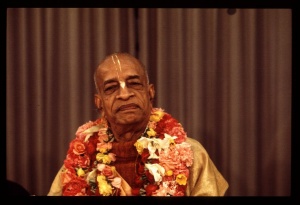SB 9.17.14: Difference between revisions
m (1 revision(s)) |
(Vanibot #0018 edit: make synonym terms in Sanskrit italic in SB - Vanisource) |
||
| Line 1: | Line 1: | ||
{{info | {{info | ||
|speaker= | |speaker=Śukadeva Gosvāmī | ||
|listener=King | |listener=King Parīkṣit | ||
}} | }} | ||
[[Category:Srimad-Bhagavatam - Canto 09 Chapter 17]] | |||
[[Category:Bhagavatam Verses Spoken by Sukadeva Gosvami - Vanisource|091714]] | |||
<div style="float:left">'''[[Srimad-Bhagavatam]] - [[SB 9|Ninth Canto]] - [[SB 9.17: The Dynasties of the Sons of Pururava|Chapter 17: The Dynasties of the Sons of Purūravā]]'''</div> | |||
<div style="float:right">[[File:Go-previous.png|link=SB 9.17.13]] '''[[SB 9.17.13]] - [[SB 9.17.15]]''' [[File:Go-next.png|link=SB 9.17.15]]</div> | |||
{{RandomImage}} | |||
==== TEXT 14 ==== | ==== TEXT 14 ==== | ||
<div | <div class="verse"> | ||
pitary uparate putrā | :pitary uparate putrā | ||
yācamānāya no daduḥ | :yācamānāya no daduḥ | ||
triviṣṭapaṁ mahendrāya | :triviṣṭapaṁ mahendrāya | ||
yajña-bhāgān samādaduḥ | :yajña-bhāgān samādaduḥ | ||
</div> | </div> | ||
| Line 17: | Line 22: | ||
==== SYNONYMS ==== | ==== SYNONYMS ==== | ||
<div | <div class="synonyms"> | ||
''pitari''—when their father; ''uparate''—passed away; ''putrāḥ''—the sons; ''yācamānāya''—although requesting from them; ''no''—not; ''daduḥ''—returned; ''triviṣṭapam''—the heavenly kingdom; ''mahendrāya''—unto Mahendra; ''yajña-bhāgān''—the shares of ritualistic ceremonies; ''samādaduḥ''—gave. | |||
</div> | </div> | ||
| Line 24: | Line 29: | ||
==== TRANSLATION ==== | ==== TRANSLATION ==== | ||
<div | <div class="translation"> | ||
Upon Rajī's death, Indra begged Rajī's sons for the return of the heavenly planet. They did not return it, however, although they agreed to return Indra's shares in ritualistic ceremonies. | Upon Rajī's death, Indra begged Rajī's sons for the return of the heavenly planet. They did not return it, however, although they agreed to return Indra's shares in ritualistic ceremonies. | ||
</div> | </div> | ||
| Line 31: | Line 36: | ||
==== PURPORT ==== | ==== PURPORT ==== | ||
<div | <div class="purport"> | ||
Rajī conquered the kingdom of heaven, and therefore when Indra, the heavenly king, begged Rajī's sons to return it, they refused. Because they had not taken the heavenly kingdom from Indra but had inherited it from their father, they considered it their paternal property. Why then should they return it to the demigods? | Rajī conquered the kingdom of heaven, and therefore when Indra, the heavenly king, begged Rajī's sons to return it, they refused. Because they had not taken the heavenly kingdom from Indra but had inherited it from their father, they considered it their paternal property. Why then should they return it to the demigods? | ||
</div> | </div> | ||
__NOTOC__ | |||
<div style="float:right; clear:both;">[[File:Go-previous.png|link=SB 9.17.13]] '''[[SB 9.17.13]] - [[SB 9.17.15]]''' [[File:Go-next.png|link=SB 9.17.15]]</div> | |||
__NOTOC__ | |||
__NOEDITSECTION__ | |||
Revision as of 10:08, 1 December 2017

A.C. Bhaktivedanta Swami Prabhupada
TEXT 14
- pitary uparate putrā
- yācamānāya no daduḥ
- triviṣṭapaṁ mahendrāya
- yajña-bhāgān samādaduḥ
SYNONYMS
pitari—when their father; uparate—passed away; putrāḥ—the sons; yācamānāya—although requesting from them; no—not; daduḥ—returned; triviṣṭapam—the heavenly kingdom; mahendrāya—unto Mahendra; yajña-bhāgān—the shares of ritualistic ceremonies; samādaduḥ—gave.
TRANSLATION
Upon Rajī's death, Indra begged Rajī's sons for the return of the heavenly planet. They did not return it, however, although they agreed to return Indra's shares in ritualistic ceremonies.
PURPORT
Rajī conquered the kingdom of heaven, and therefore when Indra, the heavenly king, begged Rajī's sons to return it, they refused. Because they had not taken the heavenly kingdom from Indra but had inherited it from their father, they considered it their paternal property. Why then should they return it to the demigods?